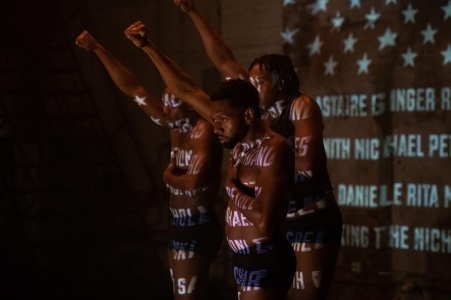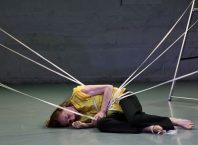
Timely, thought-provoking and captivating, Khadifa Wong’s documentary Uprooted may change the way you think of jazz dance forever; and if you’ve never thought much of jazz dance, you may come away with an entirely new appreciation for the genre. If the word jazz dance makes you think of stylized choreography with dancers in unison attired in sparkly costumes and huge smiles (not that there’s anything wrong with that), the film reveals an image of jazz dance that is far more complex and diverse. Uprooted, the Journey of Jazz Dance will be the closing film of EPOS, the international art film festival, which will take place from May 4 – 6, 2021, at the Tel Aviv Museum of Art, under the artistic direction of Micky Laron.
As in most genres, jazz has its own canon, and at least one or two of these names will be familiar to anyone with a passing interest in the art form: Jack Cole, Bob Fosse, Matt Mattox, Luigi (Eugene Louis Faccuito), Katherine Dunham and Gus Giordano. The film presents them each in turn, their individual styles and contribution to the genre conveyed in lively anecdotes from dancers who worked and/or studied with them. But that is far from the whole story. As Melanie George (dance educator, choreographer, founder and director of Jazz Is…Dance Project) comments in the film: “It is an incomplete list. It is a list that has a colonist mindset.” It is a powerful moment in the film, succinctly describing the critical issue. Although it is impossible to provide a comprehensive exploration of the genre’s development and give the appropriate recognition to its many unacknowledged or lesser-known artists and innovators in a 94-minute film, the film goes a long way towards enhancing understanding. Perhaps most important, Uprooted heightens the viewer’s awareness of all that has not been recognized, studied, and attributed. Beyond an overview of jazz history, the film offers a thoughtful look at cultural hierarchy and cultural appropriation. As dancer and choreographer Jason Samuels Smith states in the film, “Where’s the support for the community that this dance form comes from? … when people divide and come and take the dance away from the people, and say – this dance is cool but I don’t want to mess with you as a person there’s danger in that.”
An impressive cohort of dance scholars, dancers and choreographers (many of whom hold all three titles) present their critical perspective, tracing the history of jazz dance from its roots through its myriad changes over the years. In one of the film’s most poignant moments the multi-talented dancer/choreographer/director Debbie Allen recalls growing up in Houston in the 1950s, when segregation meant that there were few options for a black girl who wanted to dance. Patsy Swayze (actor Patrick Swayze’s mother) saw Allen peeking through the windows of her dance studio and invited her in to join the class. Swayze was the only teacher who accepted black students.
Yes – lots of talking heads, but they are fascinating individuals with a vivid onscreen presence. Fear not – it’s not all talk, and the interviews are interspersed with a wonderful variety of jazz dance footage, both historical and contemporary: the Nicholas Brothers tap scene from 1943, Katherine Dunham dancing, Gregory Hines in a scene from the 1985 film White Nights, Jason Samuels Smith (son of Jojo Smith) tap dancing in the studio, and so much more.
Prof. Saleemah E. Knight notes the origins of jazz in the Juba and Shika dances of Nigeria, as the African people brought to America as slaves found a means of expression, rebellion, joy and comfort in music and dance. For many of its artists, jazz was something experienced and shared, improvised in the moment, ephemeral. Cole, Fosse, and other choreographers who became well known, codified jazz dance with their signature movement vocabularies, thus making it easier to replicate, teach, and perpetuate. Uprooted inscribes lesser-known artists such as Pepsi Bethel, Fred Benjamin, Frank Hatchett and Jo Jo Smith in the history of jazz dance, and although many other artists and innovators appear in the film for only an instant – an image, a name – yet this acknowledgement of their presence and contribution places them on the map; it’s a signpost indicating direction, showing that we still have a long way to go.
Uprooted, The Journey of Jazz Dance
Directed by Khadifa Wong
USA, 94 min, English with Hebrew subtitles
Tickets are 40 – 46 NIS, and include entrance to the museum. The full program and additional information may be found on the festival website: https://www.filmart.co.il/





